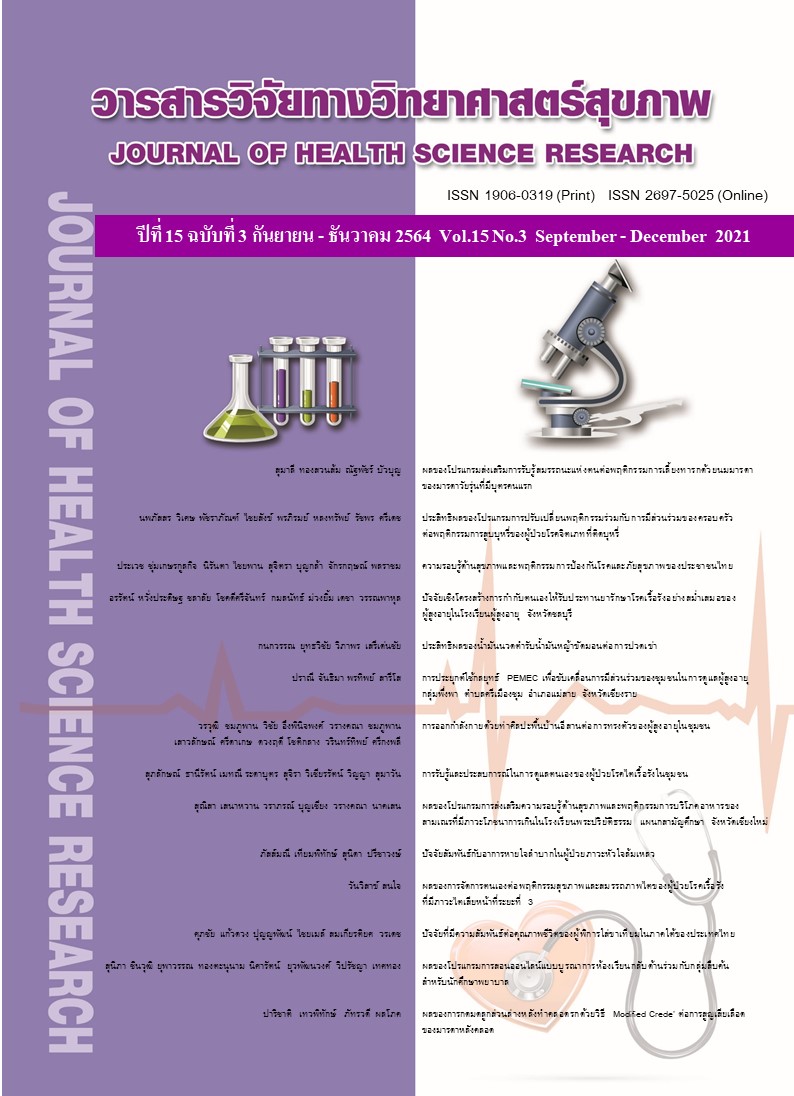ผลของการจัดการตนเองต่อพฤติกรรมสุขภาพและสมรรถภาพไต ของผู้ป่วยโรคเรื้อรังที่มีภาวะไตเสียหน้าที่ระยะที่ 3
Main Article Content
บทคัดย่อ
บทนำ : ผู้ป่วยโรคเรื้อรังที่มีไตเสียหน้าที่ระยะที่ 3 สามารถเปลี่ยนแปลงกลับไปสู่ระยะที่ 2 หรือ ระยะที่ 1 ได้ หากมีการจัดการตนเองที่เหมาะสม
วัตถุประสงค์การวิจัย : เพื่อศึกษาผลของการจัดการตนเองต่อพฤติกรรมสุขภาพและสมรรถภาพไตของผู้ป่วยโรคเรื้อรังที่มีภาวะไตเสียหน้าที่ระยะที่ 3
วิธีการวิจัย : การวิจัยกึ่งทดลอง สองกลุ่มวัดผลก่อนและหลังการทดลอง ตัวอย่างคือ ผู้ป่วยโรคเบาหวาน และหรือผู้ป่วยโรคความดันโลหิตสูง ที่มีภาวะไตเสียหน้าที่ระยะที่ 3 จำนวน 60 คน โดยแบ่งเป็นกลุ่มทดลองและกลุ่มเปรียบเทียบกลุ่มละ 30 คน กลุ่มทดลองจะได้รับกิจกรรมการจัดการตนเอง เป็นเวลา 12 สัปดาห์ เก็บรวบรวมข้อมูลก่อนและหลังการทดลอง โดยใช้ แบบบันทึกข้อมูลส่วนบุคคล แบบประเมินพฤติกรรมสุขภาพ และแบบบันทึกผลการตรวจเลือดระดับค่าซีรั่มครีเอตินิน วิเคราะห์ข้อมูลโดย การแจกแจงความถี่ ร้อยละ ค่าเฉลี่ยส่วนเบี่ยงเบนมาตรฐาน และการทดสอบค่าที ชนิดสองกลุ่มที่เป็นอิสระต่อกัน
ผลการวิจัย : พบว่า กลุ่มทดลองมีคะแนนเฉลี่ยพฤติกรรมสุขภาพสูงกว่ากลุ่มควบคุม และกลุ่มทดลอง มีระดับค่าซีรั่มครีเอตินินลดลงมากกว่ากลุ่มควบคุมอย่างมีนัยสำคัญทางสถิติ ที่ระดับ .05
สรุปผล : การจัดการตนเองของผู้ป่วยโรคเรื้อรังที่มีภาวะไตเสียหน้าที่ระยะที่ 3 ที่เหมาะสม ส่งผลทำให้เกิดการเปลี่ยนแปลงพฤติกรรมสุขภาพและสมรรถภาพไตดีขึ้น
Downloads
Article Details
บทความที่ได้รับการตีพิมพ์เป็นลิขสิทธิ์ของวิทยาลัยพยาบาลบรมราชชนนี จังหวัดนนทบุรี
ข้อความที่ปรากฏในบทความแต่ละเรื่องในวารสารวิชาการเล่มนี้เป็นความคิดเห็นส่วนตัวของผู้เขียนแต่ละท่านไม่เกี่ยวข้องกับวิทยาลัยพยาบาลบรมราชชนนี จังหวัดนนทบุรี และคณาจารย์ท่านอื่น ในวิทยาลัยฯ แต่อย่างใด ความรับผิดชอบองค์ประกอบทั้งหมดของบทความแต่ละเรื่องเป็นของผู้เขียนแต่ละท่าน หากมีความผิดพลาดใด ๆ ผู้เขียนแต่ละท่านจะรับผิดชอบบทความของตนเองแต่ผู้เดียว
เอกสารอ้างอิง
Department of Medical Services, Ministry of Public Health. Guidelines for caring for patients with chronic diseases. Bangkok: O-WitThailand; 2018. (in Thai).
Nephrology society of Thailand. Guidelines for kidney disease. Bangkok: BNS. Advance; 2016. (in Thai).
Mshasi S, Ruksin M, Akakun T. Effectiveness of Health Education Program in Self-care of Chronic Kidney Disease (CKD) among Chronic Kidney Disease Patients at Tambon Health Promoting Hospital, Namyuen District, Ubon Ratchathani Province. Journal of Graduate School, Pitchayatat. 2016;11(1): 1-8. (in Thai).
Nephrology Society of Thailand. Guidelines for kidney disease. Bangkok: BNS Advance; 2015. (in Thai).
Kanfer FH, Gaelick-Buys L. Self management methods. In Kanfer FH, Goldstein AP, editors. Helping people change: A textbook of methods. New York: Pergamon Press; 1991. pp.305-60.
Glasgow RE, Emont S, Miller DC. Assessing delivery of the five ‘As’ for patient-centered counseling. Health Promot Int. 2006;21(3):245-55.
Muang Nonthaburi District Public Health Office. Summary of chronic kidney disease screening report 2019. Muang Nonthaburi, Nonthaburi; 2019. (in Thai).
Thungtong S. Effects of self-management support program for delayed progression of diabetic nephropathy on self-management behavior and clinical outcomes in patients with uncontrolled type 2 diabetes mellitus. Songklanagarind Journal of Nursing. 2014;35(1):67-84. (in Thai).
Sonjai W, Junprasert S, Krungkripetch N. The effects of self-management on health behaviors and kidney function of chronic illness patients with chronic kidney injury stage 2. Journal of Health Science Research. 2018;12(2):88-97. (in Thai).
Sanee A. Self-management program in chronic diseases. Journal of The Royal Thai Army Nurses. 2014;15(2):129-34. (in Thai).
Kart CS, Metreess EK, Mestress SP. Human aging and Chronic disease. 1st edition. Boston: Jones and Bartett. 1992.
Reungdit B, Urairat S, Samaair S. Development of self-care behaviors for patients with chronic kidney disease in Songkhla Hospital’s Contracted Unit of Primary Care. The Southern College Network Journal of Nursing and Public Health. 2016;3(3):194-207. (in Thai).


